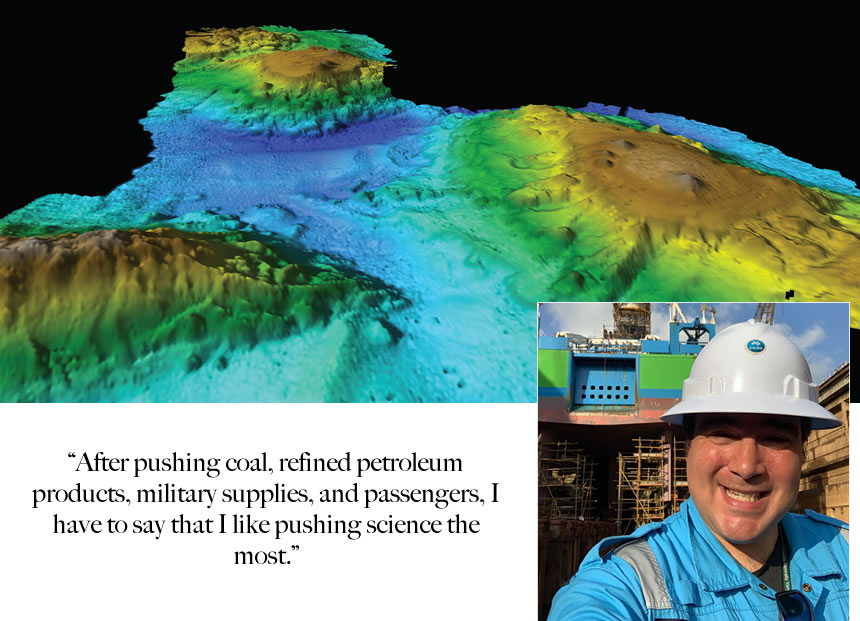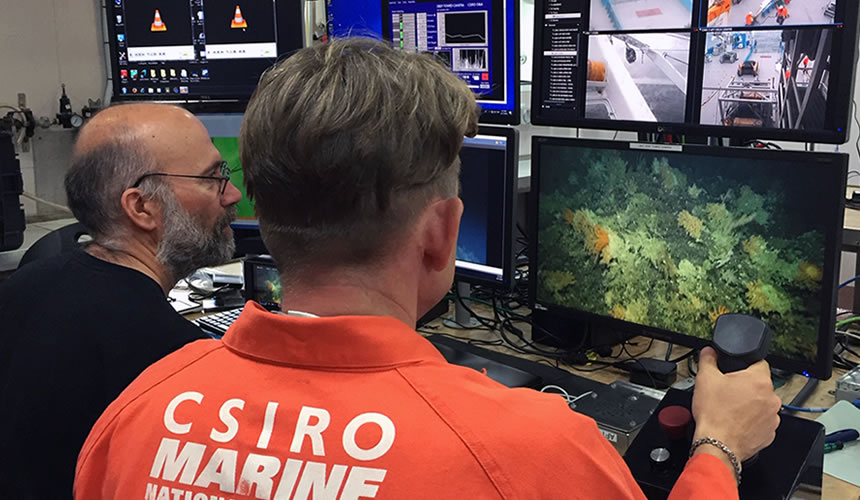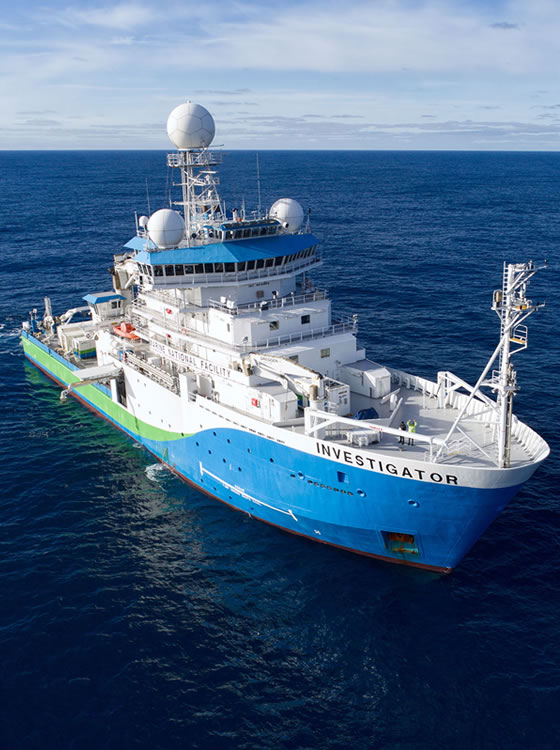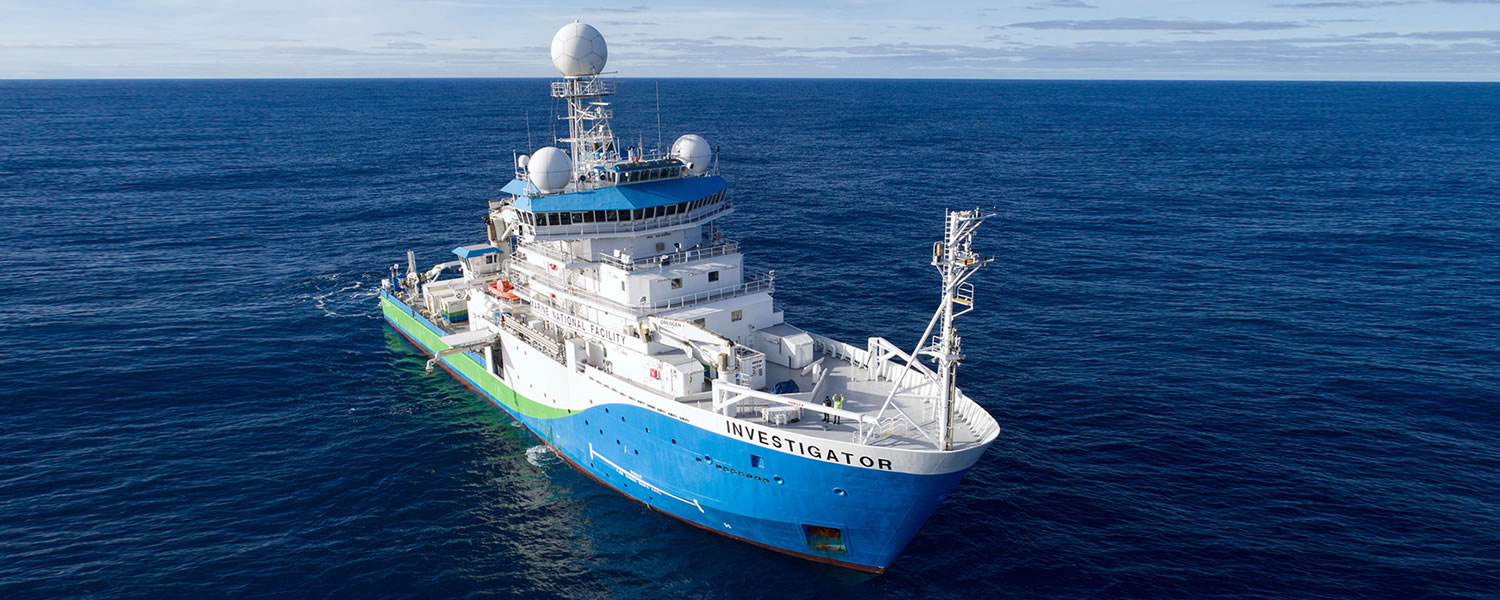When I graduated from Maine Maritime Academy, I started a career as a Deck Officer that was typical for many mariners. I worked on most types of vessels and had opportunities with widely varying types of cargoes and supply chains.
Marine research was a field I had not considered (much less knew anything about) when I left the U.S. and moved to Australia in 2009. I didn’t know then that it is one of the most fulfilling and exciting jobs in the maritime industry.

Two years ago, I became the vessel manager for the RV Investigator. The $120 million (AUD) vessel is owned and operated by Australia’s Commonwealth Scientific and Industrial Research Organisations (CSIRO) and managed through the Marine National Facility (MNF). The ship provides Australia with the capability for research anywhere across its vast marine estate.
The vessel delivers a flexible, multidisciplinary research platform available to all Australian researchers and their international collaborators. Sea time is granted for research through an independent application process that assesses both scientific excellence and national benefit of projects.
I have been lucky to work with passionate scientists who are addressing global challenges and answering some of the hardest questions our oceans pose. Each voyage of the vessel advances our knowledge about our oceans, and it has been so exciting to be part of a team for each discovery.
Enabling Multi-Disciplinary Science – Watch this video, other interactive content including a time lapse of the building of the vessel, and read more about the Investigator at https://mnf.csiro.au/en/RV-Investigator
The RV Investigator has been called the “Swiss Army Knife of marine research – good at a lot of things.” Built in the Sembawang Shipyard, Singapore, and commissioned in 2014, the 94-meter (m), or 308-foot, vessel has world-class capabilities to perform oceanographic, geoscience, atmospheric, biological research, and more. The vessel also provides a classroom for education, training, and outreach, which are key priorities of the MNF.
RV Investigator boasts a high level of technology and advanced equipment. The vessel has a “gondola,” similar in shape to a small space shuttle that is mounted 1.2 m below the hull and contains a suite of acoustic mapping instruments. The position of the gondola ensures the instruments are below the layer of micro-bubbles, which cause interference created by the movement of a ship’s hull through the water. The vessel also has a large moon pool that houses two drop keels which can be lowered 4 m below the hull. These carry instrumentation that includes acoustic mappers (for measuring fish and other life in the water column), a pelagic sediment profiler to produce maps of the seafloor, and Acoustic Doppler current profilers. (I had no idea what they were when I first started as vessel manager.)

David Witzke’s responsibilities include managing the operation and maintenance of the ship, which has a wide range of on-board and modular laboratories and facilities.
Over the past year – before the global pandemic – the vessel traveled 31,410 nautical miles and spent 193 days at sea visiting Antarctica, Macquarie Island, Heard Island, the Great Barrier Reef, and the Pacific, Indian and Southern oceans. Each voyage can accommodate 40 scientists and 20 crew, and has a possible range of up to 10,000 nm and 60 days. The Marine National Facility works closely with scientists two years before their time onboard the vessel to plan, manage, and execute their voyage. I get to work directly with researchers to find new and innovative ways to achieve their goals with the vessel’s wide capabilities. The MNF also maintains a suite of equipment that can be employed on board and we reconfigure the vessel to meet changing requirements in the academic field. Recently, we installed a new deep-sea coring capability that allows the vessel to take seabed samples five miles below the surface of the sea.
As the global climate continues to change and we discover the importance of our oceans, additional questions about our world will be asked. The marine research field of the maritime industry will be called upon more and more to provide sophisticated answers to help better our understanding of the marine environment and the global climate.

Investigator has drop camera and deep tow systems designed to capture high-quality video and still images from depths up to 6,000 m.
Academic entities like Maine Maritime Academy’s Corning School of Ocean Studies and the University-National Oceanographic Laboratory System are essential to marine research and will continue to provide more opportunities to mariners to work in this exciting field.
After pushing coal, refined petroleum products, military supplies, and passengers, I have to say that I like pushing science the most.
The Marine National Facility and the RV Investigator have given me a passion in the maritime industry I could not imagine when I was a cadet marching through the streets of Castine.
For more information about RV Investigator and to view the 24/7 livestream from the vessel, visit mnf.csiro.au/en/RV-Investigator.█
Photos: courtesy of David Witzke, courtesy of CSIRO





Post Comment
Comments are moderated and will be reviewed prior to posting online. Please be aware that when you submit a comment, you agree to the following rules:
Maine Maritime Academy reserves the right to delete any comment that does not comply with these guidelines and is not responsible or liable in any way for comments posted by its users. If you have a message for the editor, please email mariner@mma.edu.
Features
View All >Read More
Read More
Read More
Castine, Maine 04420All Rights Reserved © 2026
Privacy Policy & Terms
Web issue? Contact Webmaster